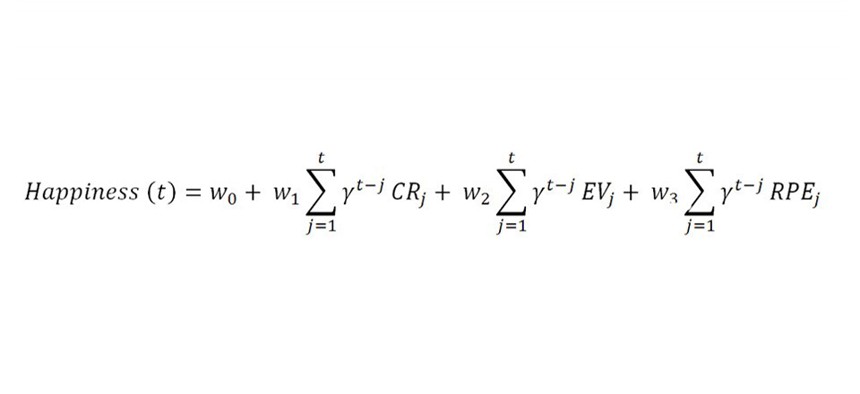
Proceedings of the National Academy of Sciences
What is an instance of happiness?
That's a squishy question philosophers have discussed for millennia. According to Sparknotes, Aristotle said happiness is an end to itself. The poet Kahlil Galbraith wrote that happiness "is your sorrow unmasked," whatever that means.
Rhetoric aside, researchers at the University College London say happiness (or at least a discrete moment of it) is represented by the formula above, recently published in the Proceedings of the National Academy of Sciences. The gist of that formula is this: Happiness spikes when we win and our expectations are low—but that happiness gradually fades over time.
To be clear, the scientists weren't studying overall life satisfaction, but rather the momentary joy that comes from winning a reward.
With MRI machines, the researchers peered into the minds of 26 subjects who were playing a gambling game. Throughout the game, the computer asked participants to rate how happy they were on a 1-to-10 scale. The researchers then not-so-simply combined brain-activity data with the reported level of happiness, and the participant's history of success in the game, and crafted the above equation.
What they found was that it wasn't the overall amount of money won in the game that gave the participants the greatest happiness. The formula incorporates a "forgetting factor"—which predicts that the happiness obtained from a previous win degrades over time. Ten more trials after a win, the original win "essentially has no influence on current happiness."
According to the formula, happiness spikes when things go better than expected. "For example," the study concludes, "a £0 prize decreases happiness if the alternative was winning £2, but increases happiness if the alternative was losing £2."
Which makes perfect sense: It's better to win when that win avoids a bigger loss. But what's surprising about this study is that the researchers were then able to use that formula to predict the general pattern of happiness in more than 18,000 people playing a similar game on a smartphone.
"Consistent with our previous results," the study's authors write, "earnings increased over time but happiness did not." By studying the brains of 26 people, the researchers could roughly predict the behaviors of 18,000.
Normally, the best tool psychologists have to measure happiness in a patient is a questionnaire, which is extremely subjective. But this research suggests there might be a way to peer into the mind and quantify joy, which can make for more precise science in diagnosing and treating mental disorders.
NEXT STORY: 12 Tips for Designing an Open-Ended Project







